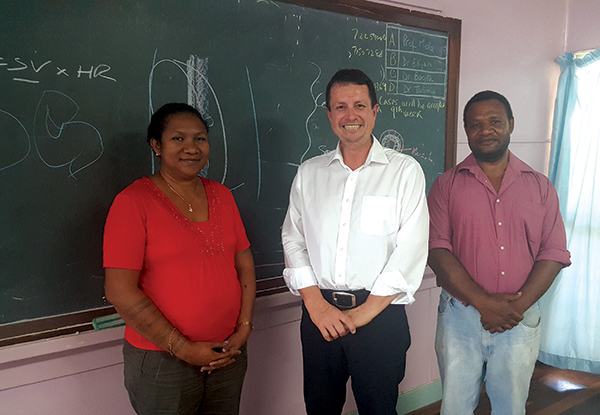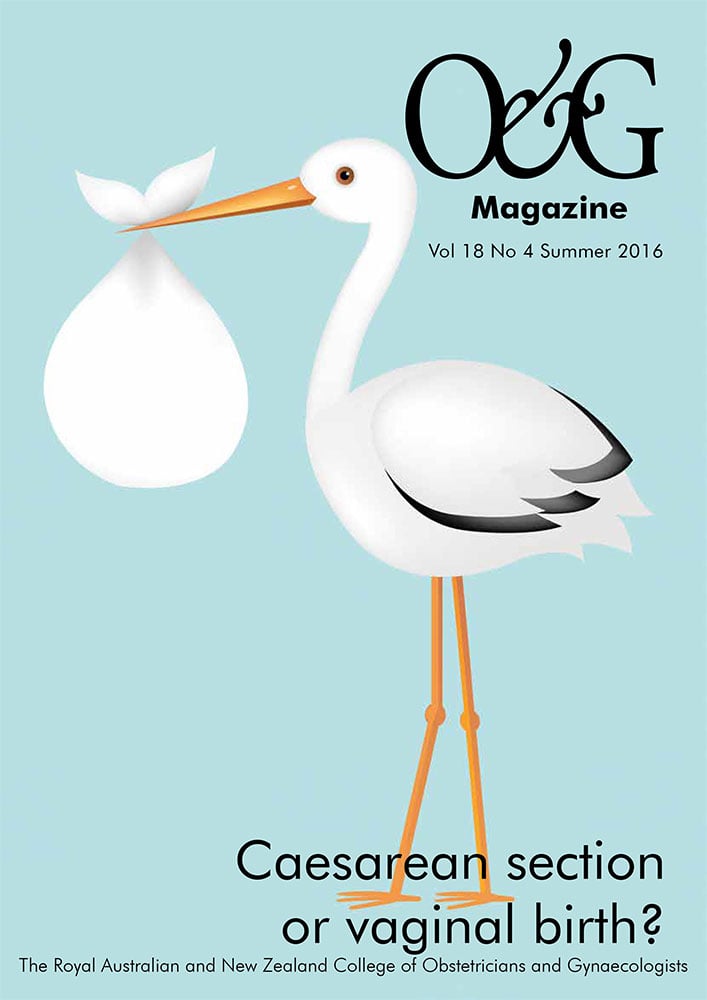I have written for O&G Magazine many times over the years, but this is my first attempt at penning the President’s column. Making the switch has cheered me up, though, because the odds are that this will be the least-read article I have ever written. Taking over the Presidency of our College certainly feels like an honour, but with it comes a great sense of responsibility. I am acutely aware that my predecessor has left big shoes to fill. Prof Michael Permezel served two terms and has been involved in College Council and the Board/Executive for longer than I can remember. During Prof Michael Permezel’s terms, our College faced the existential challenge of accreditation by the Australian Medical Council (AMC). Our continued existence depended on that accreditation process. As an organisation we did well, but many areas were identified where work and change were required. Michael provided superb leadership through this long and difficult process. Our responses to the AMC accreditation process have tested the College, but under Michael’s close supervision and attention to detail, we are doing well. However, there is still more to do.
The work of the College Council and its Board are integral to the healthy function of our specialty as a thriving and innovative discipline. The new College Board loses not only Prof Michael Permezel, but also Drs Sarah Tout and Martin Ritossa, both of whom have made an enormous contribution and had a great impact on our College and its activities. They will be missed, and we should all be very grateful for their hard work over many years. Taking their places will be Dr Celia Devenish, Dr Ben Bopp and Prof Yee Leung. All three have long track records with the College and are keen to take on new responsibilities. I am very much looking forward to working with them, and indeed with all the members of College Council. I thank those who have recently left the College Council for their commitment, enthusiasm and productivity.
Earlier this year, I met with Dr David Richmond, the outgoing President of the Royal College of Obstetricians and Gynaecologists (RCOG), who has faced many challenges during his term. David was very blunt: ‘if you achieve two of the things you hope to achieve during your term, you are doing well!’ It was a sobering assessment, but made clear for me the dangers of over-reach, of trying to take on too many challenges and attempting too much change. Fortunately, I have a wonderful group of enthusiastic colleagues with whom to work, not only on College Council and the Board but also in the Regional Committees. Our CEO, Ms Alana Killen, and the staff of College House and our regional offices are savvy and skilled. I hope everyone will have an appetite for some challenges over the next two years.

Prof Stephen Robson with Dr Kamo Dumo and Dr Jeffrey Tore, registrars at the Port Moresby General Hospital. October, 2016.
Women are pivotal to the health of our community. They generally oversee the health of their children and their partner. In many cases, women will be the strongest influence on health choices of grandparents and other relatives. For these reasons, the single most important path to improving community health and wellbeing is valuing and supporting women’s health. This is what we are all about, and we must play to our strength. Everything we do as a profession, and through our College, must be done so as to value, enhance and continue to improve women’s health.
Since our Fellows and Diplomates play the most important role in women’s health across our two countries, making sure we select the best young doctors for training, and training them well, is of prime importance for the community. Many university medical courses undervalue women’s health, so the recently developed curriculum for women’s health must be promoted and embraced widely. Nurturing interest and talent in medical students and junior doctors by supporting the Pre-Vocational O&G Society (PVOGS) can help and should be encouraged. Since training time for our future specialists is limited, offering as much support to ensure that aspiring specialists enter the training program with good basic knowledge is key. Honing our selection processes so that the most suitable candidates enter training is critical.
The embracing of safe working hours and changes in the gender mix of our trainees place strains on service provision for hospitals. It is not acceptable, though, to sacrifice training for service needs. Training hospitals have to train, and the use of the online logbook by trainees will allow much closer monitoring of surgical experience, for example. The College is in complete agreement with the Australian Competition and Consumer Commission (ACCC) that we must not limit the number of specialists. However, we have a moral imperative to ensure that the trainees who become Fellows are adequately trained and prepared. The community demands this. That means hospitals not providing adequate numbers of cases to trainees will be on notice to improve, or potentially lose trainees to sites that can provide adequate procedural experience. Our assessment processes, too, have to be of the highest quality and in line with best practices to ensure the quality of our women’s health workforce.
Fellows and Diplomates work in an environment where women’s health is undervalued, and there is pressure on the health budget. We have a responsibility for stewardship of health expenditure. However, it is important that governments at all levels understand the importance of women’s health, and that attracting and keeping the right doctors requires appropriate investment. I am intending to put considerable effort into building relationships with the Federal Government, in particular, to make sure our voice is heard. Continuing involvement in the Medicare Benefits Schedule (MBS) Review is fundamental to this, but so is nurturing productive and trusting relationships with various government departments. In this way we can position ourselves to shepherd and guide government decisions relevant to us.
A clear focus on training and standards has delivered a skilled Fellowship, and many years of hard work have put us in an excellent position. However, it should be a concern of all Fellows and Diplomates that the government is pushing ahead with revalidation. For the majority of our Fellowship, and those in private practice in particular, revalidation is the largest single threat to our practices and clinical autonomy. The experience of revalidation in the UK is not encouraging. I intend to put revalidation foremost in our list of challenges, and to tackle this head-on. Over the two years of my term, I am determined to solve the problems of revalidation for our Fellowship, and ensure this process is as easy to negotiate as possible. The College should provide the solution, not be part of the problem.
I believe the time has come to broaden our horizons as a professional body, and use our strengths to become the community’s most trusted advocates for women’s health in the broadest sense. Close to home, I am constantly disappointed by the misinformation – some of it dangerous – spread to women from unreliable websites and other media sources. We must move quickly to position ourselves as the key providers of trustworthy advice on all aspects of women’s health in our communities. I have a number of strategies I hope to implement and will let you know how things are progressing shortly.
Many women in Australia and New Zealand, and close to us, face disadvantages and we must provide a strong voice to support them. As I write these words, I am at sitting at the Port Moresby General Hospital, and am in awe of the senior and junior staff that run the obstetrics and gynaecology services here. They do an incredible job in extremely difficult circumstances, and this is a pattern found across our near Pacific neighbours. Working to improve women’s health across the Pacific should be a moral priority for all of us, and I am hoping to position our College as an agent of change.
In a similar way, many women within our own communities face enormous challenges. The College has partnered with the Migration Council Australia to develop a national strategy for migrant and refugee women’s health. I am working with the President of the Public Health Association of Australia and our own Indigenous Women’s Health Committee, and we are meeting senior Indigenous Affairs policy staff to build alliances to move forward in this area. Every woman in Australia and New Zealand, and every woman in our spheres of influence, should have access to the highest possible standard of healthcare. It should be a high priority for us all.
This issue of O&G Magazine deals with that most fundamental of issues: the birth and safety of the next generation. I can’t think of a greater responsibility than ensuring the best-possible start in life for our children. It is our responsibility. I am very much looking forward to meeting, listening to, learning from and working with as many of you as possible over the next two years. Perhaps, if I’m lucky, in two years’ time the next College President will be writing, ‘my predecessor has left big shoes to fill…’ May I wish every one of you an enjoyable and relaxing holiday season and, if you are on call, that it isn’t too busy for you.






Leave a Reply